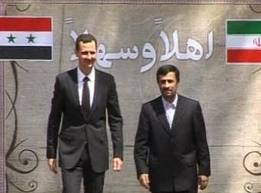 By Amir Taheri
By Amir Taheri
While President Bashar al-Assad is killing people to maintain power in Damascus, his regime may be losing the grip that Syria had built over Lebanon since the 1970s.
As Syria’s influence in Lebanon wanes, that of Iran, already significant, increases.
There are several reasons behind Syria’s declining power in Lebanon.
To start with, there is the perception, growing by the day, that Syria is so mired in domestic troubles that it would not be able to meddle in Lebanese affairs for some time.
Then there is the decline in Syria’s ability to be generous with its “allies” in Lebanon.
In fact, the regime in Damascus never had real friends in Lebanon. Those who befriended it did so either out of fear or greed.
The fear factor was established with over 100 political assassinations, including those of two Lebanese presidents, one prime minister, and dozens of parliamentarians.
The greed factor operated by giving pro-Syrian figures a share in racketeering activities orchestrated by Damascus in Lebanon.
Today, however, fear of Syria is less pungent than before while its racketeering activities are being taken over by the Lebanese branch of Hezbollah.
One sign of changing times is the increase in the number of prominent Lebanese calling on the Iranian embassy in Beirut. Bureaucrats in search of advancement, diplomats hoping for a juicy posting abroad, and businessmen looking for plum contracts know that getting a nod from Tehran could do the trick.
Iran, using Hezbollah and the Maronite bloc led by ex-General Michel Aoun as cover, has been moving its pawns at all levels of the Lebanese administration. The appointments of General Jean Kahwaji as Army Chief and of General Abbas Ibrahim as Chief of Intelligence, and of Ali Hassan Khalil as Health Minister all went ahead with Tehran’s approval as did that of Adnan Sayyid Hussein as [Lebanese] university president.
Pro-Iranian figures are also moving into key positions within the civil service.
This is of crucial importance as the service is preparing the country’s new electoral map. The idea is to do enough gerrymandering to ensure a clear majority for Hezbollah and its Aounite allies in the next parliament to be elected in 2012. Because the unicameral parliament chooses both the prime minister and the president, its control would enable Hezbollah to stage a constitutional coup and establish a pro-Iranian regime.
Hezbollah leader Hassan Nasrallah claims that his group does not intend to establish an Iranian-style “Islamic” regime. However, he has publicly stated his allegiance to Iranian “Supreme Guide” Ali Khamenei as “our leader and master”. An egomaniac, Nasrallah might not realize that his Iranian masters regard him as little more than a pawn in their “global” power game. But even he knows that Tehran would not tolerate the slightest divergence from its strategy for regional hegemony.
In a recent speech in Tehran, Iranian Armed Forces Chief of Staff General Hassan Firouzabadi spoke of Iran’s “advance military positions” in Lebanon. These include much of southern Lebanon, northern Bekaa valley, West Beirut and parts of Mount Lebanon especially Jubeil. It is no accident that both President Michel Suleiman and the Maronite Patriarch Bechara el-Rahi hail from Jubeil.
Iran is now busy linking those areas together with a parallel communications system ultimately controlled by General Firouzabadi in Tehran.
There are other signs of Iran’s heightening profile in Lebanon.
Last week, the Lebanese government banned an Iranian film because it was sympathetic to Iran’s anti-mullah opposition. Iran’s official news agency IRNA had no qualms about boasting that the film was banned “after intervention by the Iranian ambassador in Beirut.”
Then we had the announcement by President Suleiman that Lebanon had submitted a formal demand for Iran to train and arm the Lebanese army. Suleiman told IRNA that Lebanon “no longer counted on getting arms from the United States” and regarded Iran as “our strongest ally.”
Beirut and Tehran have also announced the abolition of visas. Before the current turmoil started, over a million Iranians visited Syria each year. Some of them added Lebanon to their itinerary. With Syria now regarded as a dangerous destination, Tehran claims that many Iranian tourists might turn to Lebanon as an alternative destination. However, not all Iranians are allowed to leave the country.
Since Hezbollah already controls the airport at Beirut, the abolition of visas could enable the Islamic Republic to send political, economic and military personnel to Lebanon in large numbers with greater ease.
All this does not mean that Syria is completely shut of Lebanon. Damascus still has some high profile allies including Prime Minister Najib Miqati, a wealthy contractor with business ties to the Assads. Parliament Speaker Nabih Berri, a Shi’ite, is also a long-established Syrian ally and, deep down, an opponent of Iran’s rising power in Lebanon.
However, neither Miqati nor Berri could do much for their Syrian patrons when the Assad regime itself is challenged by a resilient popular uprising.
For the time being, therefore, Lebanon seems to be on the way to becoming a satellite of the Islamic Republic. The only caveat is that the Khomeinist regime in Tehran may be exposed to the same pressures that have shaken the Baathist regime in Damascus.

Leave a Reply
You must be logged in to post a comment.